BAUHAUS IN DESSAU
A Social and Artistic Experiment in Design
 The Bauhaus was founded by Walter Gropius in Weimar in 1919 at the university there, then moved to Dessau in 1925. Bauhaus (meaning Building House) took the ideas of new construction materials of poured concrete and formed steel and other materials in buildings to imagine a while new shape to not only architecture but furniture, art and technology. The idea behind the school was to unite architects, artists and designers in a holistic movement of design. Following devastation of the First World War, design became also a form of political movement of young thinkers.
The Bauhaus was founded by Walter Gropius in Weimar in 1919 at the university there, then moved to Dessau in 1925. Bauhaus (meaning Building House) took the ideas of new construction materials of poured concrete and formed steel and other materials in buildings to imagine a while new shape to not only architecture but furniture, art and technology. The idea behind the school was to unite architects, artists and designers in a holistic movement of design. Following devastation of the First World War, design became also a form of political movement of young thinkers.
 In Weimar, the ideas of Gropius had been restricted by the city environment. Several cities competed to attract the new school, but settling on Dessau, the Bauhausers could build their school from the ground up, based on their own vision. In Dessau they could combine radical ideas for the design of architecture, furniture and everyday objects of living with their own ideas about music, dance and art into a total world. It was a concept of living in design. To create the entire front to back lived-in world of the modern man, they would embrace a new understanding of team learning like young adventurers. This unique complex, comprising a school studio building which included a stage and a canteen for performances, along with the collection of Master’s Houses, where the design theories were put into practice, is now a Unesco World Heritage site.
In Weimar, the ideas of Gropius had been restricted by the city environment. Several cities competed to attract the new school, but settling on Dessau, the Bauhausers could build their school from the ground up, based on their own vision. In Dessau they could combine radical ideas for the design of architecture, furniture and everyday objects of living with their own ideas about music, dance and art into a total world. It was a concept of living in design. To create the entire front to back lived-in world of the modern man, they would embrace a new understanding of team learning like young adventurers. This unique complex, comprising a school studio building which included a stage and a canteen for performances, along with the collection of Master’s Houses, where the design theories were put into practice, is now a Unesco World Heritage site.
 National Socialism hated the concept of free-thinking artistic experimentation, and Hitler, the simple modernity of the design, preferring a heavy authoritarian formal commonality. The youthful avant-garde of the Bauhaus could not survive. The school ended 1932 after a brief move to Berlin in 1932, but the concepts of the movement based in concept that “form should follow function” would infuse modern design in years following and now surrounding us. The experimenters of Bauhaus, Ise and Walter Gropius, Josef Albers, Lucia and Laszlo Moholy-Nagy, Oskar Schlemmer, Paul Klee, Wassily Kandinsky and others lived and worked in this artistic community.
National Socialism hated the concept of free-thinking artistic experimentation, and Hitler, the simple modernity of the design, preferring a heavy authoritarian formal commonality. The youthful avant-garde of the Bauhaus could not survive. The school ended 1932 after a brief move to Berlin in 1932, but the concepts of the movement based in concept that “form should follow function” would infuse modern design in years following and now surrounding us. The experimenters of Bauhaus, Ise and Walter Gropius, Josef Albers, Lucia and Laszlo Moholy-Nagy, Oskar Schlemmer, Paul Klee, Wassily Kandinsky and others lived and worked in this artistic community.
The Bauhaus and Masters’ Houses
 The school building, designed by Walter Gropius is alone an icon of modern design. Today, it seems rather like any building you might see on a college campus, but in its time, it was revolutionary, and its present familiarity is a demonstration of its success. The building encompasses schoolrooms and workshop spaces and offices in two wings connected by a bridge, which houses offices between the two. A white form of clean lines and simplicity from the outside, labeled with its own designed type style, a genius of branding. It is the design features which stand out, elements we now take for granted were innovations. Window glass in full panels walls to allow light into the work spaces and unique engineered window cranks, globe lighting lamps and simple function form chairs, with steam heating units designed by aircraft innovator Hugo Junkers (see Junkers Aviation Dessau).
The school building, designed by Walter Gropius is alone an icon of modern design. Today, it seems rather like any building you might see on a college campus, but in its time, it was revolutionary, and its present familiarity is a demonstration of its success. The building encompasses schoolrooms and workshop spaces and offices in two wings connected by a bridge, which houses offices between the two. A white form of clean lines and simplicity from the outside, labeled with its own designed type style, a genius of branding. It is the design features which stand out, elements we now take for granted were innovations. Window glass in full panels walls to allow light into the work spaces and unique engineered window cranks, globe lighting lamps and simple function form chairs, with steam heating units designed by aircraft innovator Hugo Junkers (see Junkers Aviation Dessau).
 A short distance from the school building are the Masters Houses, a block of white boxes in a wooded ground of trees designed by Walter Gropius for the design masters of the school to live in with their families. The houses are uncompromising in their minimalism. Two of the houses were destroyed by bombs in WWII, and have been rebuilt, but rather than try to recreate the originals, encompass the theories of simplicity and unified design and used as exhibition spaces. Two of the houses are original and still partially used for Artist in Residency housing. Three of the houses are open to the public daily.
A short distance from the school building are the Masters Houses, a block of white boxes in a wooded ground of trees designed by Walter Gropius for the design masters of the school to live in with their families. The houses are uncompromising in their minimalism. Two of the houses were destroyed by bombs in WWII, and have been rebuilt, but rather than try to recreate the originals, encompass the theories of simplicity and unified design and used as exhibition spaces. Two of the houses are original and still partially used for Artist in Residency housing. Three of the houses are open to the public daily.
Kornhaus and Törten Estate
On the banks of the Elbe River the Kornhaus Restaurant is still in operation, built in 1929 and designed by Carl Fieger, an example of Bauhaus in commercial architecture with its round open glass views. Just outside the city, the Dessau Törten Estate was commissioned by the city in 1926 as an experiment in suburban housing. Gropius envisioned the estate of terraced houses, each with a garden as an experiment in rational housing with unified construction methods. Other designers Hannes Meyer and Carl Fieger built their own advancing views of the principals, and the Steel House by George Muche and Richard Paulick, took the view to a new level.
Visit the Bauhaus in Dessau
 Open hours are 10 am to 5 pm daily for the Bauhaus. The Masters Houses are 10 am to 5 pm April to October, and 11 an to 5 pm November to March. A combination ticket to the Bauhaus and the Masters’ Houses is €13. The Dessau-Törten Estate admission is €3. A Day Ticket for all the Dessau sites for 24 hours is €22. Tickets for guided tours or audio guide is an addition €5. To get to all the sites the Bauhaus Bus runs in a circle route including the main train station and the city tourist office for €5 for a day ticket, €2 for a single ride. A photography permits is €4.
Open hours are 10 am to 5 pm daily for the Bauhaus. The Masters Houses are 10 am to 5 pm April to October, and 11 an to 5 pm November to March. A combination ticket to the Bauhaus and the Masters’ Houses is €13. The Dessau-Törten Estate admission is €3. A Day Ticket for all the Dessau sites for 24 hours is €22. Tickets for guided tours or audio guide is an addition €5. To get to all the sites the Bauhaus Bus runs in a circle route including the main train station and the city tourist office for €5 for a day ticket, €2 for a single ride. A photography permits is €4.
If in Dessau for the Bauhaus, a visit to the Hugo Junkers Aircraft Technikmuseum might also be of interest, while not officially in the Bauhaus, Junkers was closely connected with the movement. It is not on the Bauhaus Bus route, but a city bus ride, or longish walk from the Bauhaus. It is also possible to stay overnight in former student rooms at the Bauhaus Studio for your own experience in “living in design”. © Bargain Travel Europe
Find best hotel and vacation deals in Dessau on TripAdvisor
These articles are copyrighted and the sole property of Bargain Travel Europe and WLPV, LLC. and may not be copied or reprinted without permission.
See Also:
BENDLERBLOCK
- NAZI RESISTANCE MEMORIAL
PHAENO TECHNIK EXPERIENCE - WOLFSBURG
MARKET CHURCH MARTIN LUTHER - HALLE (SAALE)

